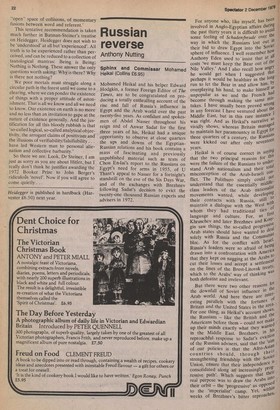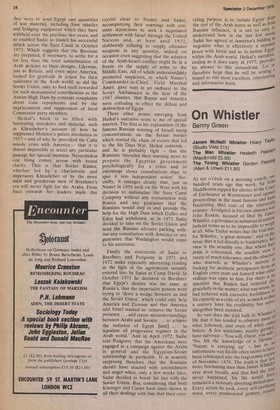Russian reverse
Anthony Nutting
Sphinx and Commissar Mohamed Heikai (Collins £6.95) Mohamed Heikal and his helper Edward Hodgkin, a former Foreign Editor of The Times, are to be congratulated on producing a totally enthralling account of the rise and fall of Russia's influence in Egypt and the Arab world over the past twenty-five years. As confidant and spokesmen of Abdel Nasser throughout his reign and of Anwar Sadat for the first three years of his, Heikal had a unique opportunity to observe at close quarters the ups and downs of the EgyptianRussian relations and his book contains a mass of fascinating and previously unpublished material such as texts of Chou En-lai's report to the Russians on Egypt's need for arms in 1955, of U Thant's appeal to Nasser for a fortnight's standstill on the eve of the Six Days War, and of the exchanges with Brezhnev following Sadat's decision to evict the twenty-one thousand Russian experts and advisers in 1972. For anyone who, like myself, has been involved in Anglo-Egyptian affairs durii!g the past thirty years it is difficult to avoid some feeling of Schadenfreude over the way in which the Russians lost out Ill their bid to draw Egypt into the Soviet sphere of influence. I well remember how Anthony Eden used to' insist that at all costs 'we must keep the Bear out of the Nile Valley.' And I also recall how angrY he would get when I suggested that perhaps it would be healthier in the long run to let the Bear in and allow him, bY overplaying his hand, to make himself as unpopular as we and the French ha,' become through making the same [Ws' takes. I have usually been proved w1°0g in any forecast I have ventured about the I Middle East, but in this rare instance was right. And as Heikal's narrative sad vividly shows, whereas Britain managfera. to maintain her paramountcy in EgyPt,', three quarters of a century, the Russian' were kicked out after only seventeen years. Heikal is of course correct in sayin.g that the two principal reasons for Ibis were the failure of the Russians to underi stand Arab nationalism and their tota misconception of the Arab-Israeli con; flict. The Politburo simply could n° understand that the essentially Tricldi.e: class leaders of the Arab nationa!is' movements wanted, while develoPlag their contacts with Russia, ili maintain a dialogue with the Wessttvvitt.-°11f whom they had traditional ties fi .rs°t language and culture. For, as Khruschev and later Brezhnev and Kos. Y" gin saw things, the so-called progress:1 Arab states should have wanted to ae.at solely with Russia and the C01'0111011 bloc. As for the conflict with Isra.e" Russia's leaders were so afraid of drawn into a confrontation with Amer17; that they kept on nagging at the Arabs t-t cut their losses and accept a settlemeri on the lines of the Brest-Litovsk treatY, which to the Arabs' way of thinking w55 both defeatist and irrelevant.
But there were two other reasons f°1* the downfall of Soviet influence in the Arab world. And here there are interi esting parallels with the fortunes ° Britain and the United States in the area' For one thing, as Heikal's account shows, the Russians like the British and the Americans before them could not make, up their minds exactly what they wante.0 in the Middle East. Brezhnev, in .his reproachful response to Sadat's evictrri of the Russian advisers, said that the of our policies is that the Afro-Asian, countries should, through t h strengthening friendship with the Scene.: Union, ensure that their independence consolidated along ad increasingly 104' ressive path'. Which suggests that their real purpose was to draw the Arabs Int°d their orbit the 'progressive' as oPP0se.,,i to the 'imperialist' camp. Yet, wit"weeks of Brezhnev's bitter reproaches' they were to send Egypt vast quantities of war material, including Sam missiles and bridging equipment which they have withheld over the previous two years, and so enabled Sadat to launch his successful attack across the Suez Canal in October 1973. Which suggests that the Russians are prepared, if necessary, to settle for a lot less than the total subordination of Arab policies to their designs. Likewise, just as Britain, and even more America, looked for gratitude in return for their assistance to the Arab world, so did the Soviet Union, only to find itself rewarded for such monumental contributions as the Aswan High Dam by constant complaints about loan repayments and by the imprisonment and suppression of local Communist party members.
Heikal's book is so filled with fascinating anecdotes and material, such as Khrushehev's account of how he suppressed Molotov's palace revolution in 1957— and of why he provoked the Cuba missile crisis with America — that it is almost impossible to select any particular passage for special mention. Nevertheless one thing comes across with brutal clarity. That is that Soviet Russia, whether led by a charismatic and impetuous Klirushchev or by the more staid and ponderous men of Brezhnev's era will never fight for the Arabs. From Suez onwards her leaders made this crystal clear to Nasser and Sadat, accompanying their warnings with con stant injunctions to seek a negotiated settlement with Israel through the United Nations and, at least until 1972, stubbornly refusing to supply offensive weapons in any quantity, indeed on occasion even suggesting that the solution of the Arab-Israeli conflict might lie in a freeze on the supply of arms to the Middle East. All of which understandably promoted suspicions, to which Nasser's Commander-in-Chief, Field Marshal Amer, gave vent in an outburst to the Soviet Ambassador in the heat of the 1967 disaster, that Russia and America were colluding to effect the defeat and destruction of Egypt.
Three other points emerging from Heikal's narrative seem to me of special interest. The first is his explanation of the famous Russian warning of Israeli troop concentrations on the Syrian border which started the chain of events that led to the Six Days War. Heikal contends — and he is probably right — that the Russians 'intended their warning more to prepare the Egyptian government psychologically for a crisis and to encourage closer consultations than to spur it into independent action'. Secondly, it emerges clearly that, just as Nasser in 1956 took on the West with his decision to nationalise the Suez Canal Company without any consultation with Russia and any guarantee that the Russians would step in and provide the help for the High Dam which Dulles and Eden had withdrawn, so in 1972 Sadat decided to take on the Soviet Union and send the Russian advisers packing withOut any consultation with America or any guarantee that Washington would come to his assistance.
Finally the statements of Sadat to Brezhnev and Podgorny in 1971 and 1972 make especially interesting reading in the light of the agreements recently entered into by Sadat at Camp David. In October 1971 he declared to Brezhnev that Egypt's destiny was the same as Russia's, that the imperialist powers were trying to 'drive a wedge between us and the Soviet Union', which could only help America and Zionism and that America and Israel wanted to 'remove the Soviet presence ... and create misunderstandings between Arabs and Soviets ... to achieve the isolation of Egypt [and] ... to liquidate all progressive regimes in the Arab world.' And in April 1972, Sadat told Podgorny that the Americans were engaged in a campaign against the Arabs in general and the Egyptian-Soviet relationship in particular. It is scarcely surprising therefore that the Russians should have reacted with astonishment and anger when, only a few weeks later, Sadat decided to break his ties with the Soviet Union. But, considering that both Kissinger and Carter have since shown in all their dealings with him that their over riding purpose is to 'isolate Egypt' frnal the rest of the Arab states as well as front Russian influence, it is not so easy M understand how in the last few weeks Sadat has agreed at America's bidding tn negotiate what is effectively a separate peace with Isreal and so to isolate Foe within the Arab world. Heikal's narrative, ending as it does early in 1977, provides no answer to this conundrum. I-et us therefore hope that he will be writing a sequel to this most excellent, entertaining and informative book.







































 Previous page
Previous page